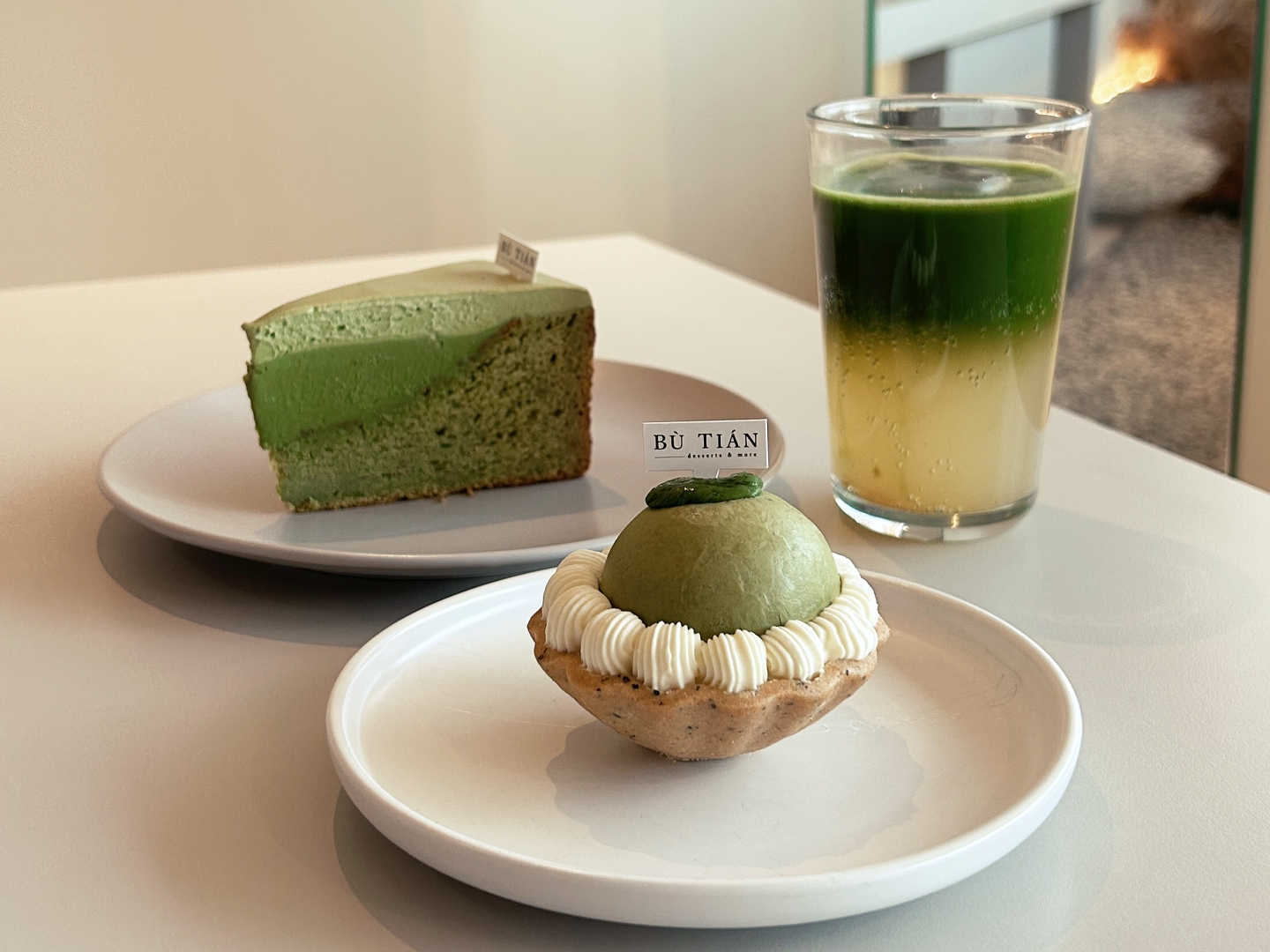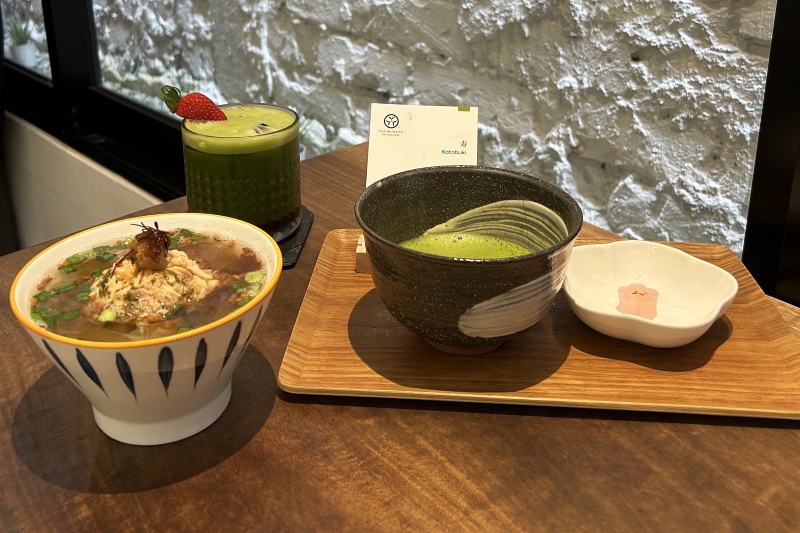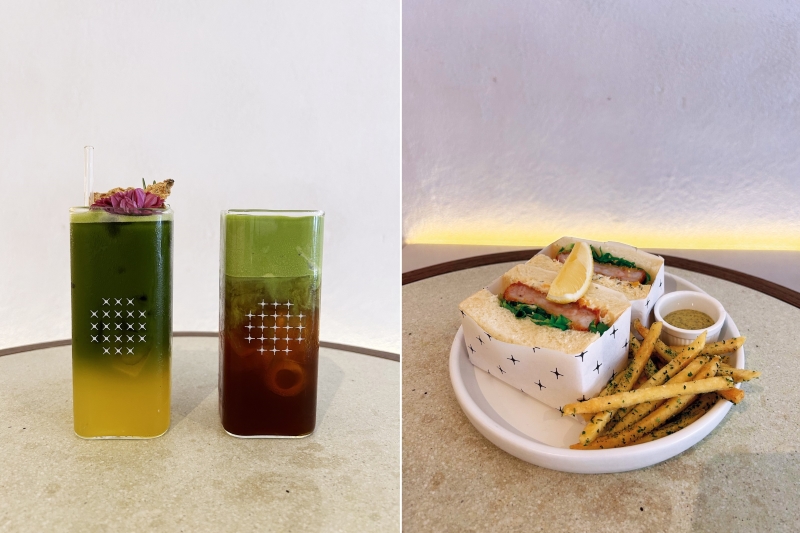
Much of BuTian’s display case is occupied by the classic trio of Japanese tea flavours (All photos: Genie Leong & Quincy Tan/ The Edge)
Food trends come and go, but one that sees no signs of slowing down soon is matcha. Hailing from the Land of the Rising Sun, it contains 10 times the antioxidants of regular green tea, soothes anxiety and boosts energy levels without the caffeine crash many experience with coffee. The concentrated beverage, made by whisking finely ground tea leaves in hot water until a frothy top appears, is commonly enjoyed plain and unsweetened, in lattés and as a popular dessert flavour.
As demand for matcha reached an all-time high — so much that it triggered a shortage of tencha leaves in Japan around October last year — its close cousins have also stepped into the limelight. Hojicha (roasted Japanese green tea) as well as genmaicha (green tea with toasted brown rice) are two of the most common, though more niche variants can be found in some specialty tea rooms and cafés.
These days, getting your fix can be quite the game of Russian Roulette. Not only will the average latté cost you around RM12 (and this is before any additional charges for alternative milks), not all drinks are created equal. Enthusiasts know the feeling of receiving a pale and tasteless concoction that leaves you wondering what you forked out your hard-earned cash for. Need pointers for the places in the Klang Valley that take their tea seriously? This is the list for you.
Matcha was introduced to Japan in the 12th century by Zen Buddhist monk Eisai, who brought back tea seeds from his visit to China. These were planted on temple grounds in Kyoto, which remains one of the few locations in Japan where matcha is cultivated today.
Offering premium and ceremonial varieties imported from the historic capital, Chabashira Tea Roastery in Taman Paramount, Petaling Jaya, has made its mark among local tea lovers. The café — named after the lucky occurrence where a tea stalk floats vertically in one’s cup — is decorated with artefacts referencing Japanese culture and the founder’s tea journey, including a slightly tattered crimson parasol, framed chasen and chashaku and an elaborate bride’s kimono embroidered with gold.
When ordering the traditional tea service, guests choose their preferred whisking level, which can change texture and aroma. The Kotobuki (meaning “blessing”) with a thick, frothy foam is served in a ceramic chawan and has a delightfully green fragrance. Creamy on the palate with a lingering sweet aftertaste, it is perfect for sipping over lengthy conversation and with sugary kohakutou, a type of wagashi. Meanwhile, the Strawberry Matcha perks up the senses with a tangy syrup that thankfully tastes like the real fruit, and is ideal for newcomers who have yet to build up an appreciation for plainer, vegetal options.
Though Chabashira is known for its shiratama dango desserts and matcha cheesecake, we recommend the Salmon Ochazuke for a warm, savoury option. Shiawase tea made from green tea, Uji matcha, rishiri kelp and roasted rice is poured hot over a scoop of seasoned, shredded fish on top of shortgrain rice, making a satisfying blend of ocean and mountain flavours that satiate both stomach and soul.
129 Jalan 20/7, Taman Paramount, PJ. Closed on Mondays. Sun-Thurs, 1-10pm; Fri-Sat, 1-11pm.
Ichi-go ichi-e is a Japanese term credited to 16th-century tea master Sen no Rikyū that roughly translates into “once in a lifetime” and has a connection to tea ceremonies, rituals and other special gatherings. The phrase, which reminds people to cherish and make the most out of the present, is the slogan for Hvala, a specialty matcha café hailing from our neighbour across the Causeway.
The Malaysian flagship store in Plaza Arkadia, Desa ParkCity, opened its doors last October and has become a hit. Its biggest appeal is arguably its gelato selection, which gradually increases in intensity, much like the famous Suzukien Matcha in Asakusa, Tokyo. Indulge in the icy treat on its own or in several of the other desserts, such as the dairy-free waffles or chaffogato (gelato with a shot of matcha or hojicha, which we personally prefer for a nutty, caramel element). Should you fancy a slightly different flavour profile, go for a scoop of Goma (black sesame) or Shiro Matcha Azuki (white tea with red bean).
One of the most popular items is the Matcha Tiramisu. Ladyfinger sponge cakes are soaked in the tea and layered with mascarpone cream and a liberal dusting of the verdant powder. Do not be fooled by the adorable box it comes in — it is surprisingly decadent and gets cloying after a few bites.
Better balance can be found in the drink choices. The hojicha goma latté in particular, with a toasty, almost chocolatey character, is a winner for us.
Block EG2, Plaza Arkadia, 3 Jalan Intisari Perdana, Desa ParkCity, Kuala Lumpur. Mon-Thurs, 11am-9.30pm; Fri-Sun, 11am-10.30pm.
Those who recall 108 Matcha Saro’s previous outlet in Suria KLCC would have rejoiced upon learning of its revival in The Exchange TRX following a two-year hiatus. This global franchise prides itself on using matcha from Uji, Kyoto, a location famed for its impeccable quality of tea. Rather than simply adding a viridian touch to generic sweets, Matcha Saro’s menu boasts a selection of traditional treats presented with a contemporary twist.
The Matcha Parfait Soft Serve Deluxe, for example, is a harmonious blend of powdery, chewy and creamy textures surely familiar to any lover of classic Japanese confections. Balanced precariously upon a silky twist of soft serve is a mound of earthy red bean paste, accompanied by bouncy dango, unsweetened matcha kanten (better known as agar-agar) and lumps of fragrant warabimochi dusted in nutty kinako. Enjoy several bites of the milky yet bitter ice cream before digging deeper into the gems of smoky brown sugar jelly at the bottom of the cup.
The store also specialises in obanyaki (also known as imagawayaki, depending on the region of Japan), produced on large diveted pans that exude a freshly baked aroma simply irresistible to passersby. While custard fillings are available, we must insist on the rich green matcha version generously packed with red bean. Inside the picture-perfect browned crust is a piping hot, chewy dough, teeming with elegantly umami tea flavour. When eaten with the pocket of soft bean filling, the synergy of this time-tested pairing is unmistakable.
Curious about the number? “108” is derived by visually breaking down the kanji for “tea” which, from top to bottom, looks like the numerical characters 20 and 88. Add them up and they yield the auspicious digits.
Lot C.OS.06, Level Concourse, The Exchange TRX, Persiaran TRX, Imbi, KL. Open daily, 10am-10pm.
“Not too sweet” — the holy grail of Chinese dessert philosophy. While these words are most commonly uttered as a gold stamp of approval by older generations, more and more health-conscious young’uns are beginning to favour tamer proportions of sugar in their treats. It is an ethos that guides the offerings at BuTian (literally “not sweet” in Mandarin), named to promise its clientele that every bite will be flawlessly balanced.
Much of BuTian’s display case is occupied by the classic trio of Japanese tea flavours. The Triple Genmaicha Cake is saturated with warm roasted aromas, encapsulating the essence of green tea and brown rice in all three of its layers. A delicate top coat of subtle cream sits above a luscious white chocolate-based ganache. At its base, one finds a brownie-like bed of gateau which, for its dense appearance, eats with the levity of a sponge. The textural contrast does an excellent job of adding variety to the overarching taste, while the uneven ratios make each bite slightly different.
The café’s shortcoming lies in its repetitiveness, however, as many items share the base components. The quaint Matcha UFO benefits from a thin sesame sablé crust to mix things up, but while the matcha ganache and cream dome have the powder satisfactorily incorporated, they are muddled by the overpowering whipped cream border.
For a refreshing spritzer to mix things up, the Matcha Yuzu soda is excellent for its strong front note of matcha earthiness, with the sweet citrus taking a backseat.
16-1 Jalan Indrahana 1, Taman Indrahana, KL. Closed on Wednesdays. Thurs-Tues-, 11am-7pm.
Ōno prides itself on specialising in two of the most popular caffeinated beverages in the world. Even the store’s minimalistic aesthetic of plain white walls is solely accented by two symmetrically placed marble countertops — green on the left, brown on the right — representing the iconic drinks. Its confidence is not unfounded, either. Here you will discover an exceptionally curated series of matcha- and coffee-based items ranging from timeless classics to remarkably creative signature concoctions.
Where Ōno shines best, however, is in its ability to combine the two. Its signature creation, romantically named When Two Worlds Collide, comprises a thick cap of luxurious single cultivar matcha cream foam above a brilliant bubbly base of carbonated Ethiopian cold brew. While the initial sips excite the palate with contrasting mouthfeels (the taste is reminiscent of coffee jelly), the true ingenuity of this beverage reveals itself over time: the head’s density causes it to gradually meld into the sparkling jo, resulting in a constantly evolving drinking experience — so no stirring!
Meanwhile, the Fūrin — a tropical blend of ume, passionfruit, mango, lime and soda topped with Ajisai matcha — is a refreshingly fruity formulation, but the weakness of its tea element leaves one wanting.
All that caffeine got you craving something solid? The locale’s Japanese-style sandwiches showcase pillowy soft bread tenderly wrapped around an indulgent volume of fillings you could measure in inches. While plenty of sweet options are available, the Crispy Ebi Katsu Taru Taru Sando — plump shrimps with a pleasing bite coated in a panko crust, lettuce and a generous slather of tangy, punchy tartar sauce, all made even better with a healthy squeeze of lemon — is a prime savoury pick.
47 Jalan SS2/30, SS2, PJ, Selangor. Closed on Tuesdays. Wed-Mon, 10.30am-6pm.
This article first appeared on Jan 27, 2025 in The Edge Malaysia.







